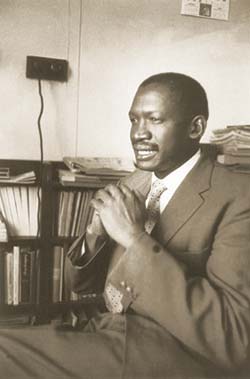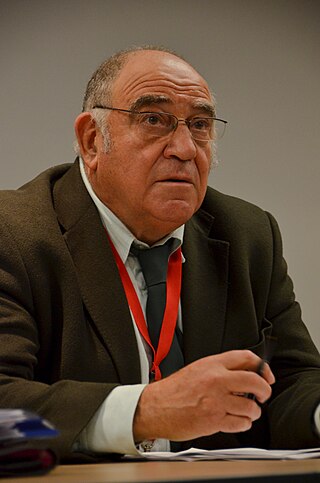
Walter Max Ulyate Sisulu was a South African anti-apartheid activist and member of the African National Congress (ANC). Between terms as ANC Secretary-General (1949–1954) and ANC Deputy President (1991–1994), he was incarcerated on Robben Island, where he served more than 25 years' imprisonment for his activism. He had a close partnership with Oliver Tambo and Nelson Mandela, with whom he played a key role in organising the 1952 Defiance Campaign and the establishment of the ANC Youth League and Umkhonto we Sizwe. He was also on the Central Committee of the South African Communist Party.
The Rivonia Trial is a trial that took place in apartheid-era South Africa between 9 October 1963 and 12 June 1964, after a group of anti-apartheid activists were arrested on Liliesleaf Farm in Rivonia. The farm had been the secret location for meetings of uMkhonto we Sizwe (MK), the newly-formed armed wing of the African National Congress. The trial took place at the Palace of Justice, Pretoria, and led to the imprisonment of Nelson Mandela, Walter Sisulu, Govan Mbeki, Ahmed Kathrada, Denis Goldberg, Raymond Mhlaba, Elias Motsoaledi, Andrew Mlangeni. Many were convicted of sabotage and sentenced to life.
Raymond Mphakamisi Mhlaba was an anti-apartheid activist, Communist and leader of the African National Congress (ANC) also as well the first premier of the Eastern Cape. Mhlaba spent 25 years of his life in prison. Well known for being sentenced, along with Nelson Mandela, Govan Mbeki, Walter Sisulu and others in the Rivonia Trial, he was an active member of the ANC and the South African Communist Party (SACP) all his adult life. His kindly manner brought him the nickname "Oom Ray".

Helen Suzman, OMSG, DBE was a South African anti-apartheid activist and politician. She represented a series of liberal and centre-left opposition parties during her 36-year tenure in the whites-only, National Party-controlled House of Assembly of South Africa at the height of apartheid.

Robert Mangaliso Sobukwe was a South African anti-apartheid revolutionary and founding member of the Pan Africanist Congress (PAC), serving as the first president of the organization.

Ahmed Mohamed Kathrada, sometimes known by the nickname "Kathy", was a South African politician and anti-apartheid activist.
Events from the year 1962 in South Africa. This year is notable for its internal and international resistance campaigns against the country's Apartheid legislation. Umkhonto we Sizwe, the militant wing of the African National Congress, made its first sabotage attacks in 1961, and Nelson Mandela traveled to Ethiopia to rally support for Umkhonto and justify the attacks. Nelson Mandela was sentenced to jail for 5 years upon returning to South Africa for illegally leaving the country. The international sporting community also showed its displeasure with the government's laws. FIFA suspended South Africa in 1962 for fielding an exclusively-white South African national football team, forcing South African football authorities to add black players to the team. The government, in turn strengthened methods of enforcing Apartheid, and the Robben Island prison was made a political prison in 1962.

Ronald Kasrils is a South African politician, Marxist revolutionary, guerrilla and military commander. He was Minister for Intelligence Services from 27 April 2004 to 25 September 2008. He was a member of the National Executive Committee (NEC) of the African National Congress (ANC) from 1987 to 2007 as well as a member of the Central Committee of the South African Communist Party (SACP) from December 1986 to 2007.

Sathyandranath Ragunanan "Mac" Maharaj is a retired South African politician, businessman, and former anti-apartheid activist. A member of the African National Congress (ANC), he was the first post-apartheid Minister of Transport from 1994 to 1999. He was later the official spokesperson to the President of South Africa, Jacob Zuma.
The Little Rivonia Trial was a South African apartheid-era court case in which several members of the armed resistance organization Umkhonto we Sizwe faced charges of sabotage. The accused were: Laloo Chiba, Dave Kitson, Mac Maharaj, John Matthews and Wilton Mkwayi. A confederate of theirs, Lionel Gay turned state witness, and in return, the prosecution dropped the charges against him.

Internal resistance to apartheid in South Africa originated from several independent sectors of South African society and took forms ranging from social movements and passive resistance to guerrilla warfare. Mass action against the ruling National Party (NP) government, coupled with South Africa's growing international isolation and economic sanctions, were instrumental in leading to negotiations to end apartheid, which began formally in 1990 and ended with South Africa's first multiracial elections under a universal franchise in 1994.
Billy Nair was a South African politician, a member of the National Assembly of South Africa, an anti-apartheid activist and a political prisoner in Robben Island.
Amina Cachalia, OLB was a South African anti-Apartheid activist, women's rights activist, and politician. She was a longtime friend and ally of former President Nelson Mandela. Her late husband was political activist Yusuf Cachalia.
Ismail Ahmed Cachalia (1908-2003), popularly known as Moulvi, was a South African political activist and a leader of Transvaal Indian Congress and the African National Congress. He was one of the leaders of the Indian Passive Resistance Campaign of 1946 and the Defiance Campaign in 1952. The Government of India awarded the fourth highest Indian civilian honour of Padma Shri in 1977.
Indres Elatchininathan Naidoo was a South African anti-apartheid activist. An early member of the people's liberation army, Umkhonto we Sizwe, Naidoo served 10 years in prison on Robben Island for sabotage between 1963 and 1973. After his release from prison, Naidoo played a leading role in the revival of the struggle in the 1970s until he was obliged to go into exile in 1977. He served the African National Congress (ANC) in Mozambique and in the German Democratic Republic. The ANC was unbanned in 1990, and Naidoo returned to South Africa the following year. When the ANC won the 1994 general election, Naidoo was appointed to the Senate and served in Parliament until 1999. In 2014, Naidoo was awarded the Order of Mendi for Bravery in Silver.

Robben Island Prison is an inactive prison on Robben Island in Table Bay, 6.9 kilometers (4.3 mi) west of the coast of Bloubergstrand, Cape Town, South Africa. Nobel Laureate and former President of South Africa Nelson Mandela was imprisoned there for 18 of the 27 years he served behind bars before the fall of apartheid. Since then, three former inmates of the prison have gone on to become President of South Africa.

Devikarani Priscilla Sewpal Jana was a South African human rights lawyer, politician and diplomat of Indian descent. As a member of the African National Congress (ANC) during the anti-apartheid movement, she participated in both legal activism as well as in the underground movement to end apartheid. She represented many significant figures in the movement, including South African president Nelson Mandela, Winnie Madikizela-Mandela, Steve Biko, Govan Mbeki, Walter Sisulu, and Archbishop Desmond Tutu. Jana was one of the very few South Africans who had access to political prisoners, including Mandela, in the maximum security Robben Island prison, and served as an emissary for coded messages between the political prisoners and the ANC leadership.
Sonny Venkatrathnam was a South African anti-apartheid activist and human rights activist who was imprisoned in the Robben Island Maximum Security Prison along with other anti-apartheid activists including Nelson Mandela, Govan Mbeki, and Mac Maharaj. He was most famously known for smuggling an edition of The Complete Works of William Shakespeare into the prison. The book was shared with many of the high-profile prisoners in the prison and was called the Robben Island Bible.
Mahwidi John "Mokgomana" Phala was a South African politician and former anti-apartheid activist from Limpopo. He represented the African National Congress (ANC) in the Limpopo Provincial Legislature from 1994 to 1999 and in the National Assembly from 1999 to 2009.
Muzivukile Curnick Ndlovu, also spelled Muzuvukile, was a South African politician, anti-apartheid activist, and trade unionist. A veteran of the African National Congress, he represented the party in the National Assembly during the first democratic Parliament from 1994 to 1999. He was also a former national chairperson of the United Democratic Front, a former secretary of the Railway and Harbour Workers' Union, and a former regional commander of Umkhonto we Sizwe (MK) in Natal Province.










